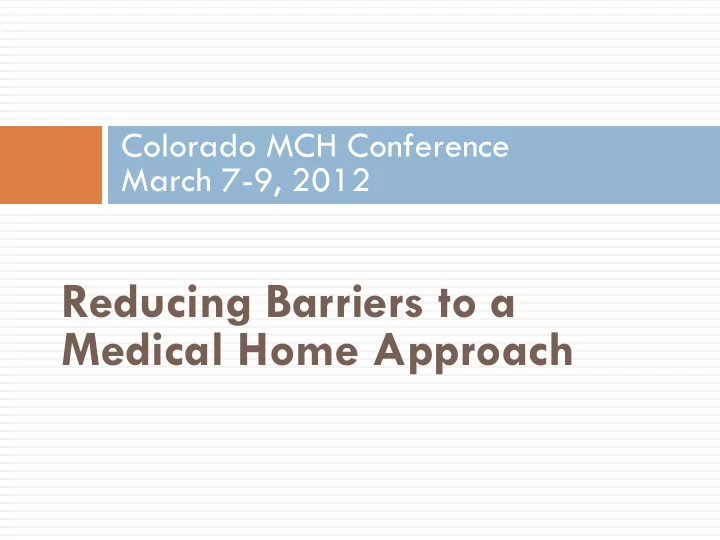

Colorado MCH Conference March 7-9, 2012 Reducing Barriers to a Medical Home Approach
Objectives Increased understanding of the background and context for the MCH medical home priority Increased understanding of components of local logic model and action plan Increased knowledge of technical assistance and resources to support local planning for and implementation of the MCH medical home priority
Rachel Hutson, MSN, RN, CPNP Children and Youth Branch Director Jane Gerberding, RN Local Systems Nurse Consultant Jennifer Schroeder, PhD JAS Associates, Systems Evaluation Consultant MCH MEDICAL HOME PRIORITY
MCH Priorities – Progress to Date Development of 9 2010 Needs Identification of 9 MCH Assessment MCH Priorities Implementation Teams (MITs) Development of Development of State & Local LOCAL level logic STATE level logic Implementation! models & action models & action plans plans
Identification of the MCH Priorities How/why medical home was selected as a priority? What qualitative and quantitative data was used in the selection process?
MCH National Performance and Outcome Measures NPM 3: The percent of children with special health care needs age 0-18 who receive coordinated, ongoing, comprehensive care within a medical home National Outcome 2: All children will receive comprehensive, coordinated care within a medical home
Colorado Medical Home Data 59.3 percent of children/youth ages 0-17 meet the criteria for having a medical home 43.1 percent of children/youth ages 0-17 who have a special health care need meet the criteria for having a medical home versus 62.6 percent of children/youth without a special health care need From the National Survey of Children’s Health (2007)
Colorado Medical Home Data The Colorado Medical Home Advisory helped provide qualitative data related to the identification of barriers to a medical home approach Lack of adequate communication and collaboration amongst medical home efforts Policies that do not support a medial home approach and/or lack of policies that support a medical home approach Lack of consumer voice and influence on decision- making Lack of adequate support for providers Lack of adequate support for community-based systems
MCH Priorities – Progress to Date Development of 9 2010 Needs Identification of 9 MCH Assessment MCH Priorities Implementation Teams (MITs) Development of Development of State & Local LOCAL level logic STATE level logic Implementation! models & action models & action plans plans
Medical Home MIT MIT Team Lead: Rachel Hutson MIT participants include: Children and Youth Branch staff Other Prevention Services Division Staff who are focused on medical home External partners
MCH Priorities – Progress to Date Development of 9 2010 Needs Identification of 9 MCH Assessment MCH Priorities Implementation Teams (MITs) Development of Development of State & Local LOCAL level logic STATE level logic Implementation! models & action models & action plans plans
State Logic Model and Action Plan State and local logic models mirror one other State and local action plans contain the same strategies Action plan strategies are focused on the base of the pyramid
Core Public Health Services Delivered by Maternal & Child Health Agencies Direct Health Care Services (gap filling) Basic health services and health services for children with Special Health Care Needs (CSHCN). Enabling Services Classroom health education, CYSHCN care coordination, motivational interviewing and client education. Population-based Services Statewide newborn screening, school district-wide health education, child care and health care provider training and outreach, public education/messaging. Infrastructure-building Services Needs assessment, evaluation, program planning, policy development, coalition development and management, standards development, workforce development, systems-building initiatives, and information systems.
State Logic Model and Action Plan Designated CDPHE staff serve as leads for each of the strategies: Mobilizing partnerships: Rachel Hutson and Medical Home Policy Coordinator Policy: Medical Home Policy Coordinator Consumer voice: Eileen Forlenza and Anne-Marie Braga Provider support: Zula Solomon Community support: Jane Gerberding
MCH Priorities – Progress to Date Development of 9 2010 Needs Identification of 9 MCH Assessment MCH Priorities Implementation Teams (MITs) Development of Development of State & Local LOCAL level logic STATE level logic Implementation! models & action models & action plans plans
LOCAL LOGIC MODEL
Local logic model Long term impact: All children and youth, including those with special health care needs, receive comprehensive coordinated care within a medical home Four strategies: Mobilizing partnerships Policy Consumer voice Provider support
LOCAL ACTION PLAN
Local Action Plan The action plan has been shaped and informed by the experiences of several key groups who have been working on medical home issues at the community level: local HCP systems building efforts; local Early Childhood Health Integration grantees; and local pilot communities from the Medical Home HRSA grant (Boulder, Summit, Mesa and Larimer)
Local Action Plan Early childhood focus: The medical home action plans must include at least one objective focused on the early childhood population Importance of early identification of and support related to special needs Opportunity to align and leverage resources with existing early childhood efforts
Local Action Plan Components of the Action Plan Template Context Goals Objectives Target population Criteria for success/as measured by Strategies Milestones/Key activities Monitoring plan
Using the Action Plan Template Objective A: Mobilize partnerships A.1.1: Identify key stakeholder group A.1.2: Creating a team charter A.1.3: Identifying barriers A.1.4: Identifying collaborative action steps A.1.5: Identifying roles A.1.6: Strategic learning A.1.7-9: Evaluating collaboration A.1.10: Medical home technical assistance
Using the Action Plan Template Objective A: Mobilize partnerships Discuss some examples of what a local action plan might include Three groups of 10 40 minutes
Wrap Up Highlights from small group discussions Additional questions and/or technical assistance needs Upcoming technical assistance opportunities
THANK YOU
Recommend
More recommend